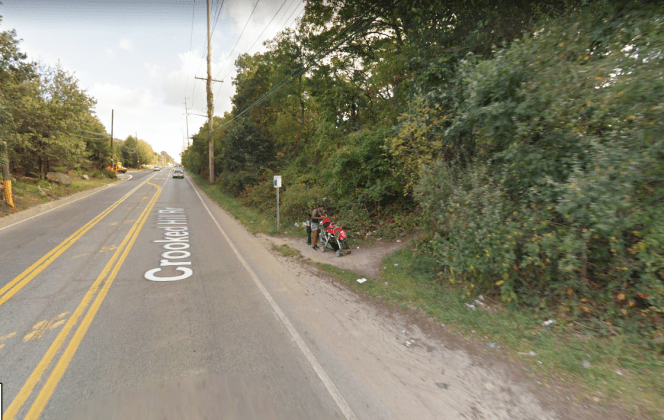One of the nation's worst bus stops has gotten a slight upgrade after reaching the Elite Eightin Streetsblog's annual "Sorriest Bus Stops in America" contest.
This stunningly bad bus stop in Suffolk County — an eastern and largely affluent suburb of New York City — has been spruced up with a level concrete platform to replace the worn-out patch of mud and dirt that previously existed at the well-used stop, local government staff informs us.
Its inclusion on our competition caught the attention of county officials, who made a special effort to make it less sorry. Here is the result.
This still-sorry bus stop is not going to win any design competitions. But Jonathan Keyes, an urban planner with Suffolk County who sent us the above photo, wrote:
We’ve shifted the stop further south so that buses will stop at an improved location closer to the Long Island Women’s Empowerment Network/Family Service League. We also did some in-house engineering to regrade the site and utilized on-call contractors to lay the concrete pad. ... We recognize, of course, that this stop is still far from perfect; unfortunately, for instance, there was no budget at this time for a shelter, and it is still a pad that is unconnected to a larger pedestrian network and nearby destinations.
But he says Crooked Hill Road in the town of Islip is due for a major capital upgrade and is scheduled to receive sidewalks in the next few years so this is just an interim solution. Suffolk County manages a suburban transit system with 2,729 stops, Keyes says, and operating costs have been rising faster than state support for transit. (Where have we heard that before — oh, everywhere.)
This is not the first bus stop that received an upgrade after being shamed nationwide by our annual contest. Our runner-up from 2016, in Kansas City, received a complete overhaul, that took it from entirely sorry to fully respectable in 2017. The stop serves Kauffman Stadium, where the Kansas City Royals play.
The goal isn't really to fix individual bus stops, but to get local officials and the public thinking about these forgotten spaces beforethey are held up for national shame.






